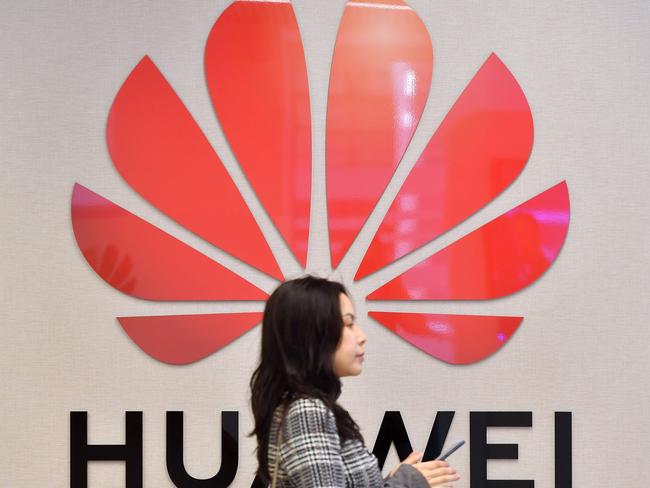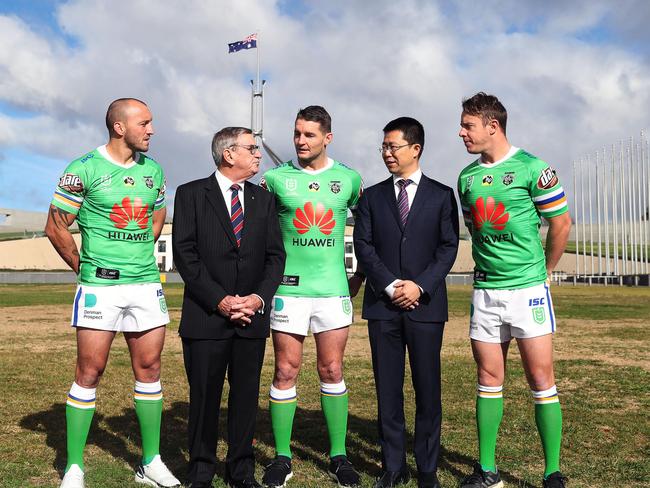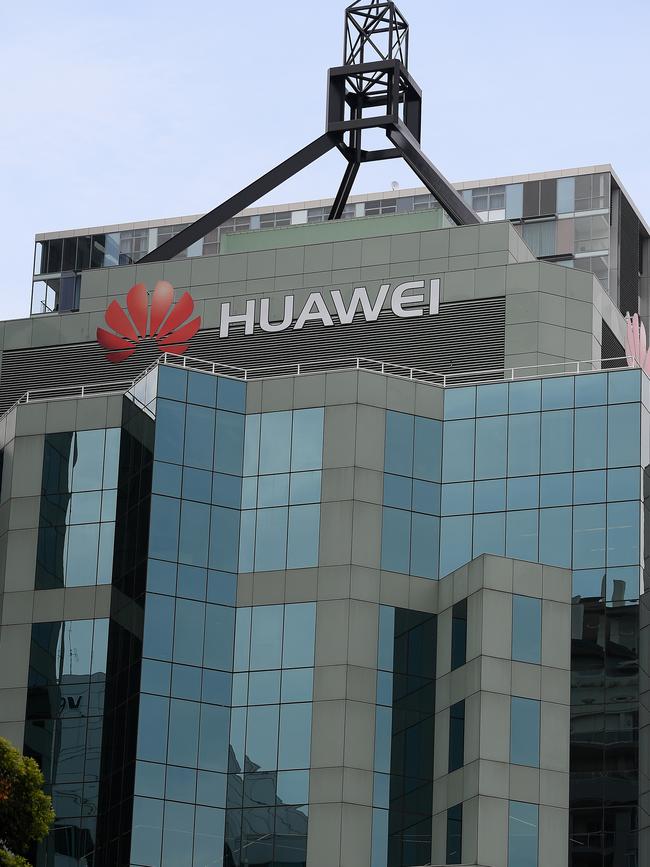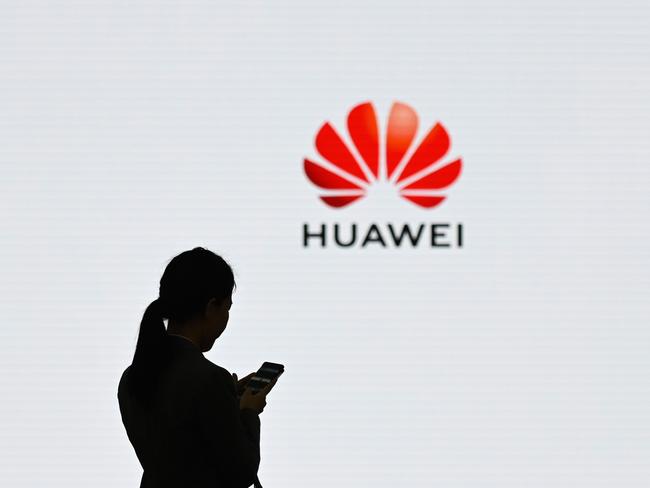Huawei waves goodbye: Why the Chinese tech giant is pulling out of Australia
After it lured celebrity ambassadors like Sophie Monk, China’s tech giant Huawei is pulling out of Australia, among fresh claims it poses a national security risk.

Technology
Don't miss out on the headlines from Technology. Followed categories will be added to My News.
One of China’s most powerful companies is pulling out of Australia, closing research labs, ending partnerships, and retrenching hundreds of employees among fresh claims it poses a national security risk.
Telecommunications giant Huawei, which once overtook both Apple and Samsung in smartphone sales and boasted Sophie Monk as a local ambassador, has become a shadow of its former self in Australia, with telco revenue more than halved following bans on its involvement in the country’s broadband and 5G networks.
Security experts say the Australian government’s decision to prevent the Chinese brand playing a larger role in infrastructure was the right one, among heightened diplomatic tension with the country and damning security findings against the company’s hardware.
Huawei, a multibillion-dollar communications giant and China’s 11th largest business, commanded plenty of attention in Australia at its peak, sponsoring NRL team the Canberra Raiders, partnering with James Cook University, and even opening a $60 million research facility in Melbourne.

But Huawei’s fortunes have since crumbled Down Under, with financial documents showing it now boasts fewer assets, less revenue and staff, and has shut down many of its Australian ventures.
Only 145 members of its once 1200-strong workforce are still employed in Australia, and its board of six directors, including chairman and Navy Rear Admiral John Lord, was dissolved in 2020.
The company’s revenue from telephone carriers more than halved from $460 million in 2019 to just $216 million in 2020, and sales to consumers plummeted from $148 million to just $84 million.
None of Australia’s three major phone carriers currently sell Huawei handsets.
The financial statement, filed with Australian Securities and Investments Commission, also noted that Huawei’s “scale in the carrier network business will continue to decline as a result of the 5G government announcement in 2018”.
The company was contacted for comment.

But Monash University senior lecturer Dr Lennon Chang said, although controversial, then Prime Minister Malcolm Turnbull’s decision to ban Huawei and other China-based firms from building 5G towers in Australia was the right call.
“If you were coming from a competition standpoint, you’d say this is not the right thing to do but from a national security perspective it is,” he said.
“The Australian government needs to be very cautious about our critical infrastructure.”
Dr Chang said despite trying to “rebuild trust,” the Shenzhen-based company was still beholden to China’s 2017 National Intelligence Law that could compel it to perform “intelligence work” on behalf of the government when instructed.
And a recent security audit by the Lithuanian National Cyber Security Centre found two Chinese-made smartphones, including a Huawei model, had significant security vulnerabilities that could impact users.

Australian Strategic Policy Institute analysts Fergus Hanson, who heads its International Cyber Policy Centre, said while “it’s never good to have anyone lose their jobs,” the decision to stop Huawei building Australian infrastructure “has been further vindicated as we’ve gone forward”.
“There have been lots of examples of Chinese states co-opting its companies and more risks identified from the use of Chinese technology in many forms,” Mr Hanson said.
“It makes this a necessary decision. And if you look at China’s moves in terms of economic coercion, things have only deteriorated more. This is going to be a great debate for a long time to come.”
Mr Hanson said Huawei wasn’t the only Chinese company and 5G wasn’t the only technology that should be probed for national security risks in future, however, with potential vulnerabilities from cloud storage, artificial intelligence, and smart city infrastructure, as well as the supply of some technology components like rare earth metals.
And as digital intelligence battles intensify, UNSW Canberra Cyber Centre director Nigel Phair warned Australia would have to carefully consider more suppliers.
“We need to scrutinise every investment decision we make in anything that has the name ‘critical infrastructure’ that is provided by a nation state, even a friendly nation state,” he said.
“Whether it’s Finland’s Nokia or Sweden’s Ericsson or Vodafone or AT & T, we should be dispassionate about assessments.”

HUAWEI’S CLOSURES AND CUTBACKS
– $60 million telecommunications research and development centre in Burwood, Melbourne, shut its doors in 2019
– $30 million National Training and Innovation Centre in Chatswood on Sydney’s north shore
– Ceased funding a Huawei / James Cook University Internet of Things laboratory in Cairns
– Ended Canberra Raiders NRL sponsorship in 2020 after nine years with one year left on its contract
– Closed its cloud and artificial intelligence business in April after just 14 months, citing sanctions and fierce competition
– No deals for Huawei smartphones with major carriers Telstra, Optus or Vodafone
HUAWEI 5G BANS WORLDWIDE
– August 2018: Then Prime Minister Malcolm Turnbull banned Huawei from involvement in Australia’s 5G network
– November 2018: New Zealand telco Spark was instructed not to use Huawei equipment in its 5G network due to “national security risks”
– August 2020: Taiwan blocks Huawei equipment from its 5G infrastructure in co-operation with US
– March 2021: US announces new ban on some 5G equipment being exported for use by Huawei
– May 2021: India excluded Huawei from the country’s 5G trials
– July 2021: US finalises $US1.9 billion “rip and replace” scheme to help small telcos remove Huawei hardware from their networks
– September 2021: UK phone carriers are no longer allowed to install new Huawei equipment in 5G networks, though can maintain old hardware
– October 2021: Canada due to announce its decision on whether to ban Huawei from its 5G networks after a recent prisoner swap
SMARTPHONES’ SECURITY RISK FEARS
Two Chinese 5G smartphones currently on sale in Australia have been identified as potential security risks in an alarming report from a European defence agency.
The phones, made by Xiaomi and Huawei, featured 10 serious security vulnerabilities, according to the report, with one handset even designed to censor a list of phrases including “free Tibet,” “women’s committee” and “the organisation for the liberation of Palestine”.
The discovery was made by analysts at Lithuania’s National Cyber Security Centre, which forensically investigated smartphones from Huawei, Xiaomi and OnePlus.
It found Xiaomi’s Mi 10T 5G smartphone featured a list of phrases that could be censored from users looking at the phone’s preinstalled apps, including its web browser. Target phrases included references to Taiwan independence, head coverings, dissidents, and China.
The feature was turned off in Europe but could be switched on remotely.
The analysis also found the Xiaomi phone collected information from apps on the phone and shared it with a server based in Singapore.
Red flags were also raised about the Huawei P40 5G smartphone in the report, with investigators finding users were automatically redirected to third-party app stores if the app they were looking for was not available in Huawei’s AppGallery. Potential malware was discovered on three of the third-party platforms.
Both smartphones are currently available in Australia from stores including Kogan and Catch.com.au.
Xiaomi is Australia’s sixth most popular smartphone brand, according to Statcounter, with 1.36 per cent of the market in September.
But Lithuania Defence Deputy Minister Margiris Abukevicius said he recommended consumers do “not buy new Chinese phones, and get rid of those already purchased as fast as reasonably possible”.
Originally published as Huawei waves goodbye: Why the Chinese tech giant is pulling out of Australia



